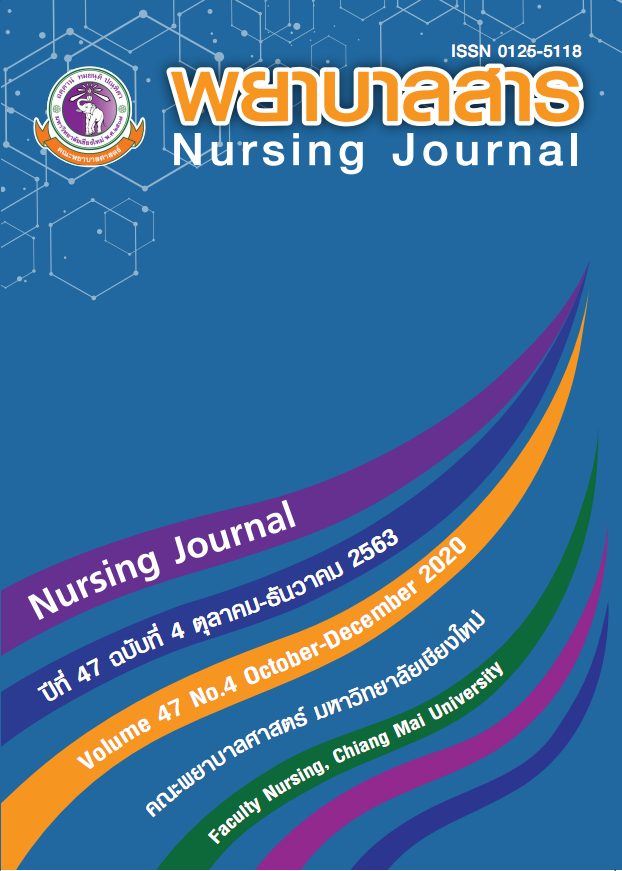Work-Family Enrichment and Intention to Stay at Work of Nurses in Private Hospitals
Keywords:
work -family enrichment, intention to stay, private hospitalAbstract
Work-family enrichment generates a positive mood, which allows nurses to cope with stressful working conditions and results in increasing the intention to stay in employment positions. This correlational descriptive study was to explore at work-family enrichment, intention to stay, and its relationship among nurses in private hospitals. The participants consisted of 155 professional nurses who are working in two private hospitals in Chiang Mai. The research instrument included the work-family enrichment scale developed by Carlson
et al. (2006) and the scale of intention to stay developed by Dolerdee Rattanapitikon (2009). The alpha coefficient for work-family enrichment scale was .96 and the alpha coefficient of the scale of intention to stay was .84 Data were analyzed by descriptive statistics and Spearman rank correlation coefficient.
Results of the study were as follows:
- Nurses experienced work-family enrichment at a high level.They recognized that resources gained in their work facilitated their family role at high level and also that resources gained in the family enhanced their work function at high level
- Nurses intended to stay at work at a high level and work-family enrichment had a positive significant association with the intention of the nurses to stay at their work.
The findings reveal that increasing work-family enrichment for nurses reinforces their professional motivations and decreases turnover intentions of nurses at private hospitals. It is recommended that nursing administrators foster work-family enrichment of nurses by providing nurses with psychological and materialsupport Additionally, the nursing administrator should support nurses in taking care of their family, since their family role creates a positive spillover to facilitate their working function and performance.
References
Balmforth, K., & Gardner, D. (2006). Conflict and facilitation between work and family: realizing the outcomes for organizations. New Zealand Journal of Psychology, 35(2), 69-76.
Bunnasa, W. (2007). The Relationship between the Intention to Stay in the New Nurse Job and Personal Goal Setting and Commitment to the Target: A Case Study of a Hospital. (Master’s thesis, Thammasat University). (In Thai)
Carlson, D. S., Kacmar,K. M., & Williams, L. J. (2000). Construction and Initial Validation of a Multidimensional Measure of Work–Family Conflict. Journal of Vocational Behavior, 56(2), 249-276. doi:10.1006/jvbe.1999.1713
Carlson, D. S., Kacmar, K. M., Wayne, J. H., & Grzywacz, J. G. (2006). Measuring the positive side of the work–family interface: Development and validation of a work–family enrichment scale. Journal of Vocational Behavior, 68(1), 131-164.
Chitpakdee, B., Nantsupawat, R., & Wichaikhum, O. (2013). The Relationship Between Work Happiness and Persistence in Professional Nurses. Journal of Nursing Journal, 40, 33-44. (In Thai)
Cowden, T. L., & Cummings, G. G. (2012). Nursing theory and concept development: A theoretical model of clinical nurses’intentions to stay in their current positions. Journal of Advanced Nursing, 68(7), 1646-1657.
Greenhaus, J. H., & Powell, G. N. (2006). When work and family are allies: A theory of work - family enrichment. Academy of management review, 31(1), 72-92.
Grzywacz, J. G., & Butler, A. B. (2005). The impact of job characteristics on work-to-family facilitation: testing a theory and distinguishing a construct. Journal of occupational health psychology, 10(2), 97-109.
Intutlak, K., (2013). Experiences of building work-life balance of professional nurses in a private hospital (Master’s thesis, Chulalongkorn University).
Khaophong, W. (2013). Factors predicting job satisfaction and job intentions of professional nurses in private hospitals in the Eastern region. (Master’s thesis, Burapha University). (In Thai)
Nantsupawat, A., & Sngounsirithum, U. (2019). Mentoring System and Nursing Professional Development. Journal of Nursing Journal, 46(3), 232-238. (In Thai)
National Statistical Office, Ministry of Information and Communication Technology. (2007). Hospital and Private Hospital Survey 2007. Bangkok: Bureau of Forecasting Statistics. (In Thai)
National Statistical Office, Ministry of Technology and Communication. (2012). Hospital and Private Hospital Survey 2012. Bangkok: Office of Statistical Forecasting. (In Thai)
Phanurat, P. (2013). Motivation factors of job satisfaction of professional nurses in private hospitals. Songklanagarind Nursing Journal, 12(2), 29–41. (In Thai)
Plainoi, P. (2018). Factors Influencing Happiness in Work of Professional Nurses Nakhon Nayok Hospital Nakhon Nayok Province. Journal of Applied Liberal Arts, 11(1), 92-105. (In Thai)
Rattanapitikorn, D. (2009). Predictive factors of professional nurse’job retention at Phyathai hospital (Master’s thesis, Sukhothai Thammathirat Open University). (In Thai)
Russo, M., & Buonocore, F. (2012). The relationship between work - family enrichment and nurse turnover. Journal of Managerial Psychology, 27(3), 216-236.
Sathapornwajana, A. (2008). Relationship between family support, Ethical climate, and joy at work of professional nurses, hospitals under the jurisdiction of the ministry of public health,Bangkok metropolis (Master’s thesis, Chulalongkorn University). (In Thai)
Sawangdee, K. (2010) Professional Nursing Situation in Thailand. Journal of Health Systems Research, 2(1), 40-46. (In Thai)
Taokumlue, S. (2006). Selected predictors of nurses intention to remain with organization, private hospitals, Bangkok metropolis (Master’s thesis, Chulalongkorn University).(In Thai)
Tourangeau, A. E., & Cranley, L. A. (2006). Nurse intention to remain employed: understanding and strengthening determinants. Journal of advanced Nursing, 55(4), 497-509. doi:10.1111/j.1365 - 2648.2006.03934
Wayne, J. H., Randel, A. E., & Stevens, J. (2009). The role of identity and work–family support in work–family enrichment and its work - related consequences. Journal of vocational behavior, 69(3), 445-461.
Downloads
Published
How to Cite
Issue
Section
License
บทความที่ได้รับการตีพิมพ์เป็นลิขสิทธิ์ของวารสารพยาบาลสาร
ข้อความที่ปรากฏในบทความแต่ละเรื่องในวารสารวิชาการเล่มนี้เป็นความคิดเห็นส่วนตัวของผู้เขียนแต่ละท่านไม่เกี่ยวข้องกับมหาวิทยาลัยเชียงใหม่ และคณาจารย์ท่านอื่นๆในมหาวิทยาลัยฯ แต่อย่างใด ความรับผิดชอบองค์ประกอบทั้งหมดของบทความแต่ละเรื่องเป็นของผู้เขียนแต่ละท่าน หากมีความผิดพลาดใด ๆ ผู้เขียนแต่ละท่านจะรับผิดชอบบทความของตนเองแต่ผู้เดียว






